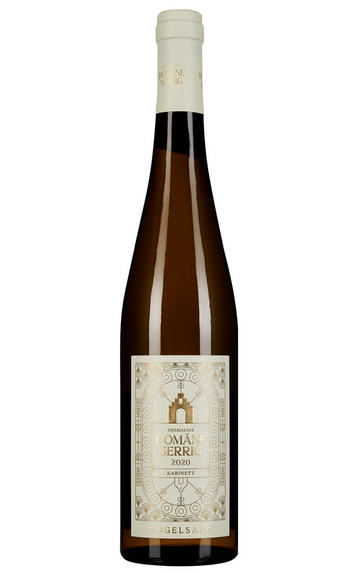
2020 Riesling, Kabinett, Vogelsang, Domäne Serrig, Saar, Germany
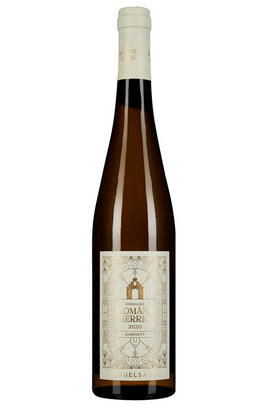
Critics reviews
10.5% stated alcohol. Natural cork.
Basket pressed and vinified in traditional oak and stainless steel, the 2020 Vogelsang Kabinett is pure, bright and fresh on the highly delicate and flinty nose that shows precise and elegant fruit intertwined with the serious, flinty minerality of the grey and red slate soils of the domaine plus coolish vegetal nuances of nettles and mint. Round and intense yet light and filigreed on the palate, this is a pure, lush and round yet also very mineral, beautifully playful and palate-tickling Kabinett with less reduction than Molitor's Kabinetts usually show at this early stage.
The sweetness is discreet and counterpointed by the immense mineral and saline drive. The finish is spectacularly long and tensioned, extremely complex and stimulating even at this age. This classic Kabinett reminds me of the finest Scharzhofberger Kabinetts from Egon Müller. It is straight, sustainably saline, aromatic and charming.
Drink 2024 - 2060
Stephan Reinhardt, Wine Advocate (September 2023)
About this WINE
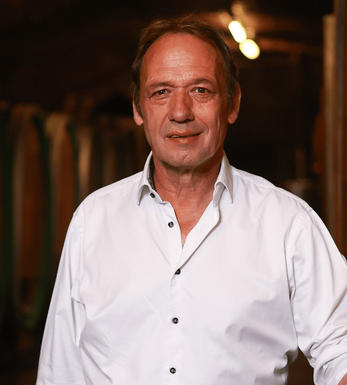
Domäne Serrig
Located in the Saar-Ruwer wine region of Germany, Domäne Serrig was bought by Markus Molitor in 2016. The estate has built a reputation for producing some of the finest Riesling wines in the world.
The vineyards are located in the village of Serrig, one of the six districts in the Saar-Ruwer wine region, and are planted with Riesling vines, which thrive in the region's cool climate and unique terroir. The winery produces several Riesling wines, including dry, off-dry, and sweet styles, typically characterised by their elegant, aromatic, and mineral flavours, with green apple, citrus, and stone fruit notes.
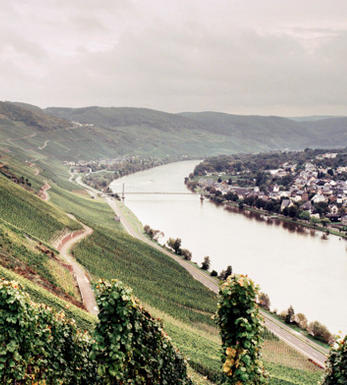
Saar-Ruwer
The Saar-Ruwer wine region is located in the western part of Germany, specifically in the state of Rhineland-Palatinate, and is one of the country's 13 wine-producing regions. The region is named after the two rivers flowing through it, the Saar and the Ruwer. It has a long history of winemaking, dating back to Roman times, although its vineyards were devastated by phylloxera in the late 19th century and later replanted with Riesling, which have thrived in the region's unique terroir.
Saar-Ruwer is relatively small, covering an area of about 1,000 hectares (2,471 acres) of vineyards. The region has a cool climate, ideal for growing Riesling grapes. The steep slopes along the river valleys provide excellent drainage and exposure to sunlight, which helps the grapes ripen slowly and develop complex flavours.
The region is divided into six districts: Saarburg, Konz, Oberemmel, Wiltingen, Serrig, and Kanzem. The wines produced here are elegant and aromatic with a distinctive minerality and are typically light to medium-bodied, with green apple, citrus, and stone fruit flavours. The region also produces some sparkling wines and a small amount of red wine from Pinot Noir grapes.
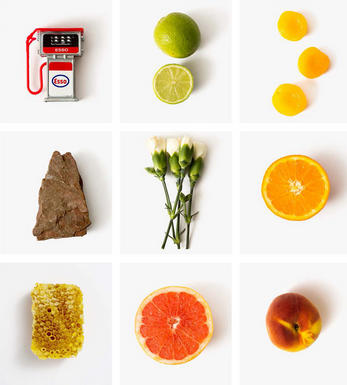
Riesling
Riesling's twin peaks are its intense perfume and its piercing crisp acidity which it manages to retain even at high ripeness levels.
In Germany, Riesling constitutes around 20% of total plantings, yet it is responsible for all its greatest wines. It is planted widely on well-drained, south-facing slate-rich slopes, with the greatest wines coming from the best slopes in the best villages. It produces delicate, racy, nervy and stylish wines that cover a wide spectrum of flavours from steely and bone dry with beautifully scented fruits of apples,apricots, and sometimes peaches, through to the exotically sweet flavours of the great sweet wines.
It is also an important variety in Alsace where it produces slightly earthier, weightier and fuller wines than in Germany. The dry Rieslings can be austere and steely with hints of honey while the Vendages Tardives and Sélection de Grains Nobles are some of the greatest sweet wines in the world.
It is thanks to the New World that Riesling is enjoying a marked renaissance. In Australia the grape has developed a formidable reputation, delivering lime-sherbet fireworks amid the continental climate of Clare Valley an hour's drive north of Adelaide, while Barossa's Eden Valley is cooler still, producing restrained stony lime examples from the elevated granitic landscape; Tasmania is fast becoming their third Riesling mine, combining cool temperatures with high UV levels to deliver stunning prototypes.
New Zealand shares a similar climate, with Riesling and Pinot Gris neck to neck in their bid to be the next big thing after Sauvignon Blanc; perfectly suited is the South Island's Central Otago, with its granitic soils and continental climate, and the pebbly Brightwater area near Nelson. While Australia's Rieslings tend to be full-bodied & dry, the Kiwis are more inclined to be lighter bodied, more ethereal and sometimes off-dry; Alsace plays Mosel if you like.


Buying options
Add to wishlist
Description
10.5% stated alcohol. Natural cork.
Basket pressed and vinified in traditional oak and stainless steel, the 2020 Vogelsang Kabinett is pure, bright and fresh on the highly delicate and flinty nose that shows precise and elegant fruit intertwined with the serious, flinty minerality of the grey and red slate soils of the domaine plus coolish vegetal nuances of nettles and mint. Round and intense yet light and filigreed on the palate, this is a pure, lush and round yet also very mineral, beautifully playful and palate-tickling Kabinett with less reduction than Molitor's Kabinetts usually show at this early stage.
The sweetness is discreet and counterpointed by the immense mineral and saline drive. The finish is spectacularly long and tensioned, extremely complex and stimulating even at this age. This classic Kabinett reminds me of the finest Scharzhofberger Kabinetts from Egon Müller. It is straight, sustainably saline, aromatic and charming.
Drink 2024 - 2060
Stephan Reinhardt, Wine Advocate (September 2023)
wine at a glance
Delivery and quality guarantee